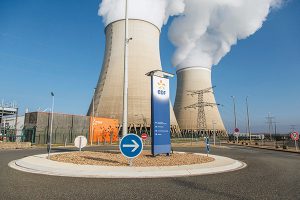Bloomberg
French and German electricity prices jumped after Electricite de France SA revised down the production forecast for its nuclear fleet that’s vital to keep the lights on in Europe.
The world’s biggest producer of nuclear power reduced its estimate by about 8% after finding defects at some reactors. It’s another blow to Europe which is already facing an historic energy crisis with natural gas stocks at their lowest in more than a decade for this time of year.
The German February contract rises as much as 22% to 235.50 euros ($270.07) a megawatt-hour while the contract for the next quarter climbed as much as 23% to 183 euros on European Energy Exchange AG. French contract for April to June delivery added as much as 24% to 191 euros.
“There is uncertainty in establishing the impact with very volatile prices recently,†said Mieke Becker, analyst at Bernstein Autonomous LLP. “As reactor inspections are ongoing, including a control program for the entire fleet, is there a risk of even more or longer outages?â€
Fresh extension of outages at several reactors means that at least nine reactors will be offline at the start of April, cutting almost a fifth of the total output, according to data from grid manager RTE. As recently as Tuesday, Ecology Minister Barbara Pompili said the country has “too many†nuclear reactors offline, as the government was trying to gain control of the crisis.
During routine once-a-decade maintenance at its Civaux and Penly reactors, the company found defaults near welds on pipes of the safety injection system circuits, it said in a statement. The start of Penly-1 was delayed by more than two months to May 30. Civaux-2’s resumption was postponed by nine months to the end of this year.
EDF now expects to generate 300 to 330 terawatt-hours from the plants this year, down from an earlier estimate of 330 to 360
terawatt-hours.
EDF Slumps by Most on Record
Electricite de France SA plunged by a record as the French government confirmed plans to force it to sell more power at a steep discount to protect households from surging
wholesale electricity prices.
The move could cost the state-controlled utility 7.7 billion euros ($8.8 billion) at market prices. EDF shares fall as much as 25% to 7.76 euros and were trading 21% lower at 8.14 euros at 9:58 am in Paris. Prices on EDF’s subordinated bonds also tumbled, with a 1.25-billion-euro social note issued last year suffering a record drop of 1.7 cents to 98 cents before recovering some of its losses.
The unprecedented step, announced by Finance Minister Bruno Le Maire in an interview with Le Parisien, is the latest decision by President Emmanuel Macron to tackle inflation and gain the support of voters ahead of April’s presidential election amid Europe’s energy crisis. The utility being part-owned by the French state makes it easier to implement this.
In a separate development, EDF said that several of its nuclear power plants in France would be offline longer than expected for repairs, prompting the company to slash its output forecast from reactors by 8%. The setback threatens to drive up power prices as Europe is already facing a historic supply crunch.
“Given the circumstances, EDF is likely to consider a capital increase,†JPMorgan Chase & Co. analyst Vincent Ayral wrote in a note. “We would recommend to avoid the stock for the time being.â€
The increase in electricity bills for households and very small businesses will be capped at 4% this year, with the government cutting a tax on electricity consumption worth 8 billion euros to help soften the
impact, Le Maire said.
Without the moves, prices would rise by 35% from February 1.
Rivals of Paris-based EDF, which are already entitled by law to buy 100 terawatt-hours of the energy giant’s annual power output at a steep discount to current market prices, will be given the opportunity to buy another 20 terawatt-hours cheaply, Le Maire told Le Parisien. That will cost EDF between 7.7 billion euros and 8.4 billion euros, depending on market prices, the minister said.
“This political intervention is certainly diametrically opposite to the government’s medium-term goals of steering the company to calmer waters with a strong balance sheet for green investments and creating a positive story around nuclear ahead of decisions to build new reactors,†Meike Becker, an analyst at Sanford C. Bernstein & Co. wrote in a note.
 The Gulf Time Newspaper One of the finest business newspapers in the UAE brought to you by our professional writers and editors.
The Gulf Time Newspaper One of the finest business newspapers in the UAE brought to you by our professional writers and editors.
